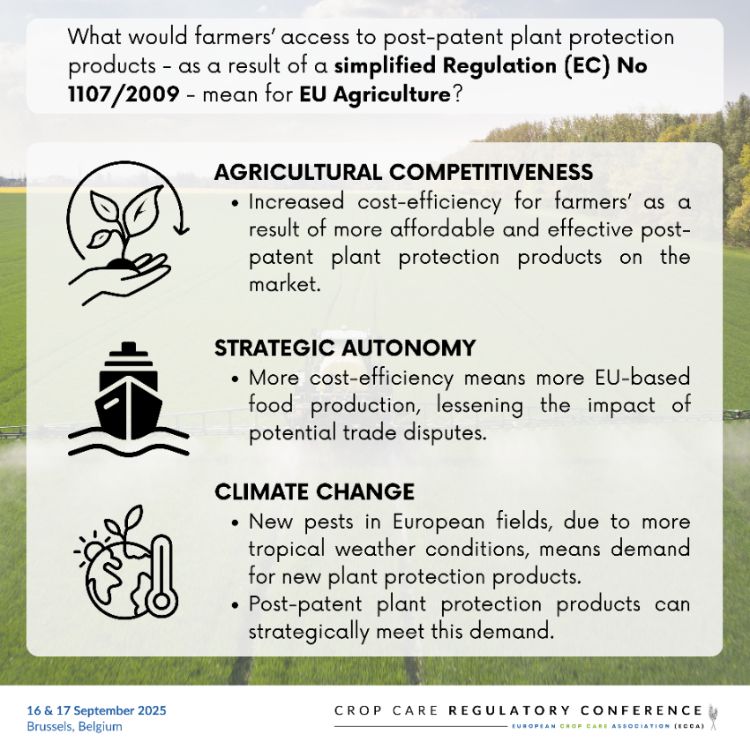The European Parliament is set to return from the summer recess in just a few days – and with it: discussions, debates and debriefs about tariffs, geopolitics and climate change, key areas that are set to continue to be at the top of European policymakers’ minds.
While the jury is still out, the wave of external shocks faced by Brussels this year has, in many ways, been instrumental in instigating a true shift in the bloc’s policymaking philosophy, with the European Commission’s Competitive Compass and the subsequently announced simplification packages, being emblematic of this.
Seeking to strengthen our Union’s resilience through competitiveness, these new policy programmes have also begun to reignite discussions on the underutilised role of post-patent plant protection products in European agriculture.
In a joint letter published in June earlier this year, Austria, Croatia, Czechia, Estonia, Hungary, Ireland, Italy, Lithuania, Portugal and Slovakia called on the European Commission to ensure the availability of effective plant protection products (PPPs). The letter represents a pivotal moment for the post-patent plant protection industry, which, for many years, has been calling for a fair and effective regulatory framework to ensure fair market access.
Access to post-patent PPPs is especially important in today’s Europe that continues to face a growing list of external challenges. While strengthening farmers’ cost efficiency, our industry’s products help farmers maintain the sustainability of agricultural production, including niche crops – often providing the only available solutions for protecting these types of crops. Thanks to these capacities, Europe’s agricultural sector can ensure its competitiveness, while, at the same time, providing strategic resilience against economic shocks like trade tariffs.
Today, our industry’s ability to shield Europe from these shocks remains mostly underutilised. As a result of a fragmented and inconsistent interpretation/implementation of key the EU regulation ruling crop protection products, Regulation (EU) 1107/2009, at the Commission and Member State level, thousands of European farmers are unable to access affordable and effective post-patent PPPs.
Not only does this system exacerbate regional inequalities across the EU, but most importantly, it leaves these regions especially exposed to bearing the biggest costs of potential crises ahead, whether that is climate-induced weather anomalies or international trade disputes.
Due to the inefficiencies of the current regulatory system and misinterpretation/application of the legislator’s intentions, post-patent PPP companies are diverting significant resources just to maintain the authorisations, which could otherwise be invested in new innovative solutions. This limits their capacity to strengthen operational resilience in areas like high value markets, climate change or economic turbulence.
Perhaps most importantly, given the current political context, our industry’s regulatory needs are fully aligned with the policy programmes like the European Commission’s Competitiveness Compass and its regulatory simplification packages.
Notably, targeted amendments to EU Regulation 1107/2009 are essential for simplifying the current regulatory framework for the post-patent plant protection industry. Those amendments could strengthen our industry’s efficiency, unlock resources for resiliency-driven investments by post-patent PPP companies – and deliver the benefits of the European Commission’s Competitive Compass for European farmers.
The joint call to the European Commission in June is certainly a cause of optimism for our industry – yet there is still a long way to go before we see the Competitive Compass for EU agriculture. The joint letter was signed by 10 EU countries, representing some of the largest agricultural producers in Europe. At the same time, we urge the remaining 17 countries to join their fellow EU Member States in recognising our industry’s underutilised contribution to Europe’s resilience-building capacities.
Guiding EU Agriculture towards the Compass: ECCA’s Crop Protection Regulatory Conference
As part of the European Crop Care Association (ECCA)’s strategy to step up efforts amid this positive political momentum, we are organising our inaugural Crop Protection Regulatory Conference. Taking place between 16-17 September at the Sheraton Brussels Airport Hotel, the conference will be the only platform in 2025 to bring together stakeholders from the post-patent plant protection industry, EU policymakers, regulatory authorities and farmers under one roof, giving our industry a unique voice to highlight the urgent need to deliver the Competitive Compass for European farmers.
For more details about the Crop Protection Regulatory Conference, visit the link here.
By entering the discount code “PARLIMAG15” The Parliament Magazine readers can enjoy a special 15% DISCOUNT on Non-Member tickets, as part of an official Media Partnership with the Crop Protection Regulatory Conference.

Sign up to The Parliament's weekly newsletter
Every Friday our editorial team goes behind the headlines to offer insight and analysis on the key stories driving the EU agenda. Subscribe for free here.